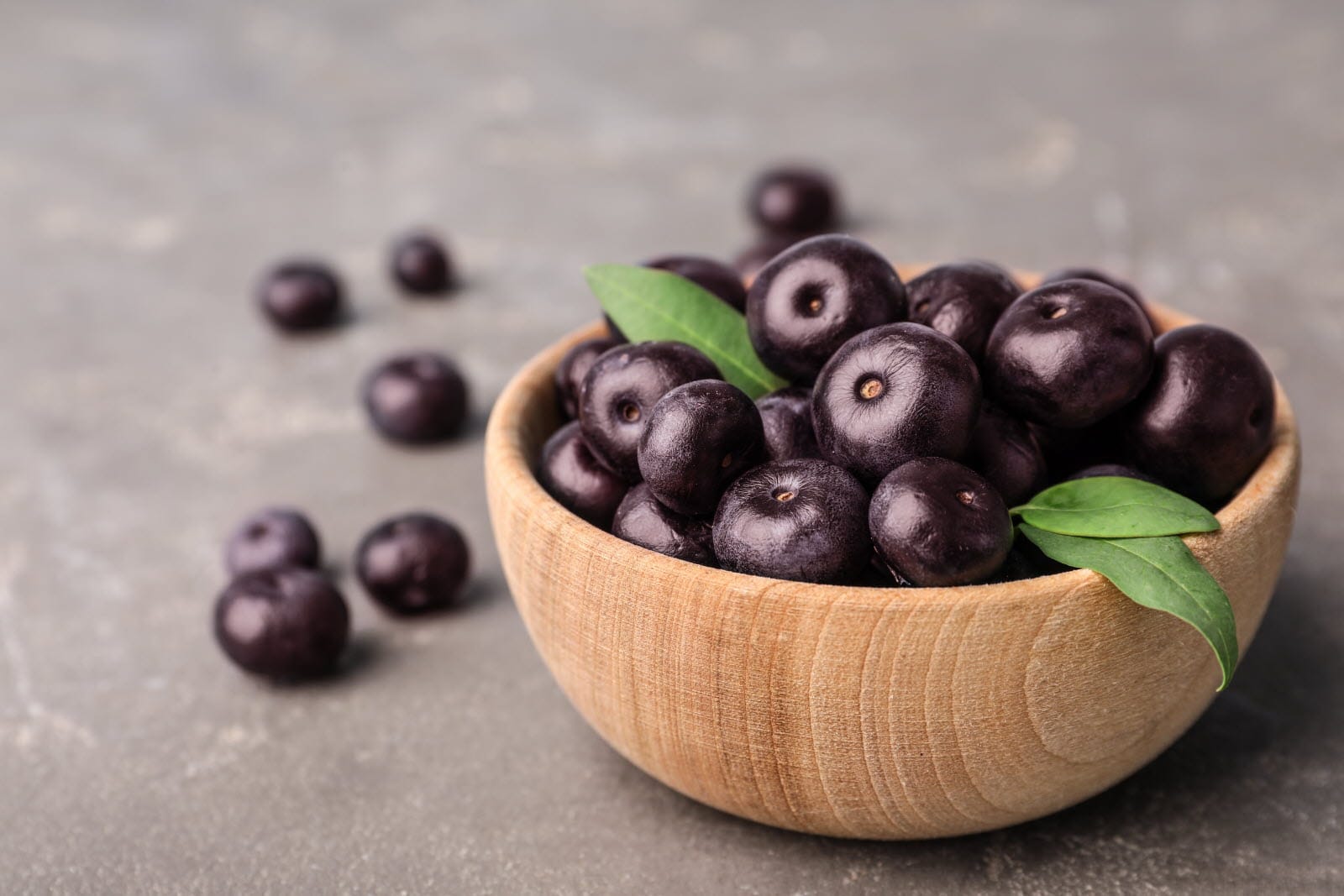Summary sheet
- Common name : Acai, Acai, Acai berry
- Other names : Assai, Wassaï
- Scientific name : Euterpe oleracea
- Family : Arecaceae (palms)
- Origin : Amazonia, South America
- Part used : Bay
- Main assets Polyphenols (flavonoids, proanthocyanidins), anthocyanins, vitamins A and C, minerals
- Main properties Powerful antioxidant | Anti-inflammatory effect | Cardiovascular support | Anti-ageing benefits
What is acai?
Acai is an Amazonian palm whose berries are renowned for their many health benefits. Described as superfoodThis small purple berry is particularly rich in antioxidants, polyphenols and vitamins. It has been eaten for centuries by the indigenous populations of South America for its antioxidant, polyphenol and vitamin properties. protective properties against oxidative stress, inflammation and cell ageing.
Thanks to its exceptional virtues, acai is now a highly prized ingredient in nutricosmetics and in food supplements natural.
Origin, habitat and culture
A palm tree from the Amazon rainforests
Acai (Euterpe oleracea) grows mainly in Amazonia, in the wetlands of the Amazon basin. This slender palm can reach 20 metres high and produces berries of a intense purple when they reach maturity.
Where can I find acai?
- Brazil (main exporter)
- Colombia
- Peru
- Venezuela
Growing and harvesting
Acai berries are harvested all year roundwith a peak during the dry season (July to December). Their growth is slowThis makes it a precious and sought-after fruit.
The name 'acai' comes from the indigenous term içá-çaimeaning "weeping fruit", in reference to the slow extraction of its pulp.
Composition and benefits of acai
Acai berries are a natural a veritable mine of nutrients and contain :
- Powerful antioxidants polyphenols, flavonoids, anthocyanins (cyanidin-3-glucoside, quercetin, orientin)
- Vitamins A, C and E
- Minerals calcium, iron, potassium
- Dietary fibre : promote good digestion
- Phytosterols beneficial effects on cholesterol
Properties and effects on health
Anti-oxidant and anti-ageing properties
Acai berries are among the foods richest in antioxidantshelping to fight against free radicals responsible for ageing premature aging of cells and skin.
👉 A study published in the Journal of Agricultural and Food Chemistry has shown that the polyphenols contained in acai have a significant high antioxidant activity and could help slow cell ageing (source).
Anti-inflammatory action
Thanks to their high polyphenol content, acai berries have a very high antioxidant capacity. anti-inflammatory action which helps to reduce joint and muscle pain.
👉 Research published in PubMed has shown that acai can inhibit certain inflammatory pathways and play a role in reducing oxidative stress and inflammatory reactions (source).
Cardiovascular protective effects
The anthocyanins contained in acai help to reduce LDL cholesterol and protect blood vesselshelping to prevent cardiovascular disease.
👉 A study by Journal of the American College of Nutrition found that consumption of acai could improve lipid profile and reduce cardiovascular risk (source).
Benefits against metabolic disorders
Some research suggests that acai may help to regulate blood sugar levelsreduceobesity and fight againsthyperlipaemia.
👉 A clinical study found that daily consumption of acai reduced insulin resistance and improved lipid metabolism (source).
How should acai be eaten?
Acai is available in several forms:
- Juices Drink neat or in a smoothie
- Food supplements capsules, concentrated powders
- Açaï bowl Mixed with other fruits and superfoods
Recommended dosage
There is no single dosage, but for supplementation, a dose of 900 to 1200 mg extract per day is generally recommended. It is advisable to follow the instructions on the product used.
Precautions and contraindications
Precautions for use
Acai-based food supplements are not recommended to :
- Pregnant and breast-feeding women
- Children
- People undergoing specific medical treatment (consult a healthcare professional)
Side effects
No major adverse effect has been reported. There is no risk of dependency or toxicity in normal doses.
Synergies and recommended combinations
To optimise the benefits of acai, it can be combined with other active ingredients:
- Antioxidant & anti-ageing → Goji berries
- Cardiovascular support → Ginkgo biloba, green tea
- Energy & immunity → Vitamin Cacerola
Summary and opinion on acai
Acai is a powerful superfoodIt is known for its antioxidant, anti-inflammatory and protective effects on health. It can easily be incorporated into a healthy, natural diet, particularly in the form of food supplements.
If you are looking for a natural active ingredient for enhance your well-being, prevent ageing and boost your energyAcai is an excellent ally.











